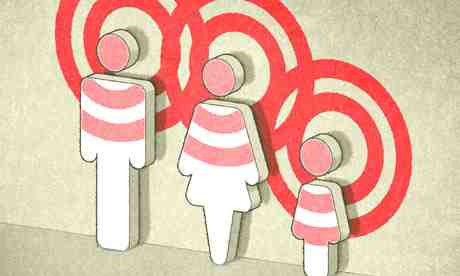
Louise Casey, head of troubled families policy, has produced a report that promises “stark real-life accounts from families, with experiences often passed from generation to generation, such as domestic and sexual abuse, teenage pregnancies, poor parenting, social care interventions, police call-outs and educational failure”. Casey conducted detailed interviews with 16 households, from which a set of policies is laid out to deal with 120,000 troubled families.
This figure of 120,000 crops up a lot: in June, Eric Pickles used it as a springboard for his “no excuses” lecture, in which he vowed that his government would be “more forceful in language, a little less understanding”. (It strikes a chill into your heart, doesn’t it, to think of Pickles going to work each day, promising to understand things less.) After the riots last year, David Cameron pledged his particular attention to this 120,000, putting Emma Harrison (head of A4e) in charge – until it transpired that she had problems of her own.
The figure is traduced so effortlessly that Jonathan Portes, the director of the National Institute of Economic and Social Research, calls it an “abuse of data”. Tim Harford did an analysis of it or you can read a thorough academic dissection here for Radio 4’s statistics series More or Less, but the top line is this: when governments talk of 120,000 families they are using figures from 2004, in which families were counted who met five of seven criteria. These were: earning a low income; nobody in the family working; poor housing; parents with no qualifications; the mother having a mental health problem; one parent with a longstanding illness or disability; and the family unable to afford basics including food and clothes.
It’s an interesting constellation, since once you’d met five, it must be all but impossible to avoid fulfilling all seven. But one thing it doesn’t mention, anywhere, is delinquency or sexual abuse or social workers or the police. You can’t use a very small sample of criminal or borderline-criminal families as your way into understanding a very large sample of families whose central uniting trait is that they are poor. Not unless we’re just going to throw in the towel of data gathering and human reason and assume poor people to be criminals.
I believe the ulterior motive is the demonisation of the poor, with the aim, in the long run, of simply slicing off these families at the bottom of what we think of as “society”. Thereafter, terms like “fairness” and “empathy” and “all in this together” can be bandied around pretty freely, because the evidence of their extinction will no longer exist. The problem families won’t count – because they severed the social contract with their criminality and un-neighbourliness.
A more generous reading is one of political expedience, that this is just an attempt to flatten out the complexity of the 120,000 with a mind to delivering the straightforward, optimistic message that these “problems” are solvable. So I’ll allow for some flexibility in how it could be interpreted, but what I won’t allow is the idea that the coalition is doing this – conflating criminality, undesirability, poverty and illness – by accident. Once is an accident. Three times, from three different people: that’s a policy.
So that’s the crowning offence, the sheer discourtesy of trying to shunt people out of society for not being rich enough. There’s an ancillary process, of which Iain Duncan Smith is master, whereby poverty is conflated with poor parenting, and this serves to dehumanise as well as alienate these “problem families”. If parenting sees us at our most loving, civilised and altruistic, then to fail at it is to have slipped off the bottom rung of the species.
Casey’s self-presentation is always that she cuts through the data and expertise and goes back to common sense … the man in the street, what does he think? Sometimes it’s amusing – when she makes a tirade against ministerial anti-binge drinking ideas – and other times it’s straight anti-intellectualism.
So much work has already been done on the experience of being at the bottom of the heap. There are ethnographic reports grouting the British Library (I found this enlightening) about what life is like at the coal face of a “multi-agency intervention”. They are conducted over weeks and over months by academics who immerse themselves in the realities of the household, not government advisers who swoop in for a couple of hours to peer at the destitute. There are studies about what causes antisocial behaviour, what works, what doesn’t (Professor Adam Crawford, for instance, launches his findings this week). Straight talking is one thing, but when you’re straight repeating work that has already been done, but sloppily, with less sophistication, drawing egregious conclusions, isn’t that a waste of time?
There is plenty of existing evidence that if you want to intervene with families, you do so in a voluntary, unstigmatising way, with a local hub providing many different services, from parenting advice to English lessons. You could call them Sure Start centres: you could stop closing them down (124 have gone), and you could stop removing their funding (often the staff are fired but the centre stays open on paper so that the local authority still gets the money – these are known as “ghost centres”).
Precisely how Louise Casey came to collude in a process so divisive and dishonest I don’t know; I hope she was tricked into it. I can’t see this trick working on everyone, however.
Twitter: @zoesqwilliams
guardian.co.uk © Guardian News & Media Limited 2010
Published via the Guardian News Feed plugin for WordPress.

This simply shows the true face of the tory party. Sick, disgusting, full of hatred of those they consider below them. And ultimately a party who i feel would not hesitate to swing as far to the right as they possibly could in order to act our their vile fantasies.